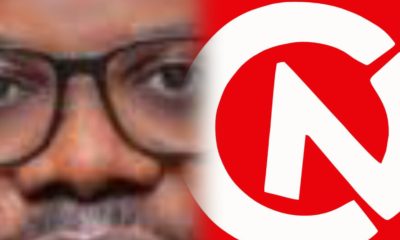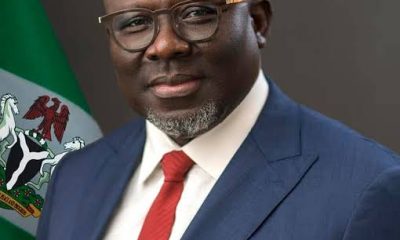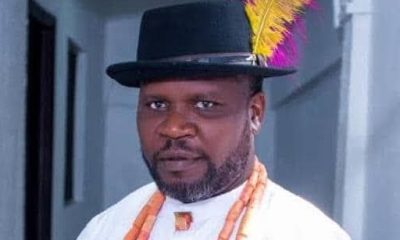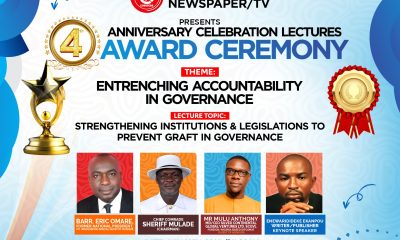National
Keynote address by Enewaridideke Ekanpou at Congress Newspaper/TV 4th anniversary celebration
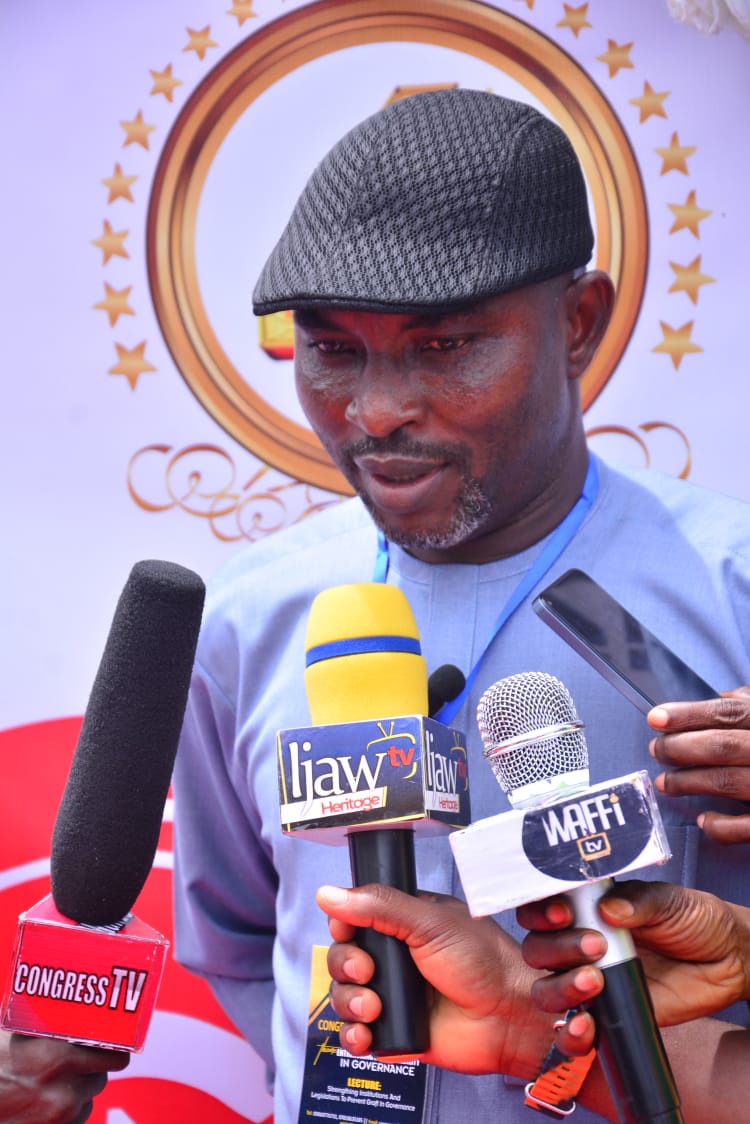
Journalists as Killers of Strong Institutions and the Society as Killers of Awakening Journalism, by Enewaridideke Ekpemupolo
Strong institutions are the pride of a nation because they kill the virus of graft. Strong institutions usually emerge from a single-minded determination and decisive action. Nddc, Nimasa, the security agencies, legislative arms, judiciary, governmental ministries, parastatals, Efcc, Icpc and many others can work effectively without being mired in graft if journalists and privileged individuals could collaborate and work, always awake to their daily responsibilities. Today the various institutions in Nigeria are somewhat weak and defective because journalists and wealthy individuals in the society have gone awful though President Tinubu is currently at work to build strong institutions through his various policies at different stages of implementation. My concern here today does not revolve around the government but rather it revolves around journalists and wealthy individuals in the society identified here as the blight on strong institutions.
Though fundamentally focused on journalists and privileged individuals here, it must however be stressed that through the meaningful policies of President Tinubu who is distinguished by his insight into the plague of the Niger Delta, the upstream sector of the Nigerian economy has been positioned for optimum performance through the pragmatic advocacy of TANTITA against oil theft and pipeline vandalism just as the PAP has been similarly positioned to pursue the true objectives of Amnesty through the refined borderless policy of administration adopted by Chief Dr Dennis Otuaro, the current PAP boss. These are institution-strengthening strategies being audaciously replicated at the state level by Governor Sheriff Oborevwori in the pursuit of his MORE agenda strategically aligned with President Tinubu’s Renewed Hope agenda.
Editorials usually foreground the position of a given newspaper on any current matter but today it is fast becoming the norm among most online newspapers for editorials to be devalued and overshadowed by mere journalistic reports. Editorials foreground the position of the paper on a current national issue that burdens the ordinary people. It saddens these days that most online newspapers journey journalistically everywhere without editorials and punchy opinion articles to awaken the government to meaningful action on key aspects of government policies being implemented. It is more of sympathy and support journalism animated by brown envelope and financial inducements. This has to change if we must build strong institutions to activate good governance and accountability. Without an awakening journalism, it is a smooth sail to JAPA; and JAPA is a phenomenon that depletes our human resources in Nigeria as our best brains migrate to different western countries for self-actualisation and social belonging.
Journalists kill the growth of strong institutions when some newspapers cowardly and tactically refrain from publishing articles that constructively attack the individuals and institutions they have an established sympathy for in their reportage and editorials. Some newspapers even condescend to the level of ‘alerting’ such individuals and institutions to a waiting article on their table written by someone, particularly when the article is critically biting. Such timely alert usually attracts heavy financial inducements from the alerts which eventually kills the article they did not even write, neither would they be held responsible if the said article backfired legally. Such a critical article or press release should be published however the calibre of persons involved and logically wait for defensive reactions from the affected persons.
It is the worst form of betrayal in journalism for a journalist or a newspaper to take dictation from certain individuals on what to publish and what not to publish based on financial inducements. Journalists or newspapers involved in this objectionable condescension cannot build strong institutions and demand accountability from the government because they have lost the moral authority and moral compass to bark at others who have erred.
The above scenario is what I call condescending, barbaric APROKO journalism that kills strong institutions. Let us wash our hands off APROKO journalism; let us wean ourselves off APROKO journalism and embrace the type of journalism that carries echoes of Ernest Sissei Ikoli, the pioneering Nigerian journalist.
Born 25 March 1893, Ikoli who hails from Twon in Bayelsa State,, the first editor of Daily Times but later left the editorial desk to run his own paper named The African Messenger when Daily Times did not give him his required space to critically engage the colonial policies of Sir Fredrick Lord Lugard, is an Ijaw man. With his constant criticisms, the legislative council in Lagos, party politics and representative government were injected into the 1922 Clifford constitution. He was also known for his criticism of the 1914 amalgamation of the North and the South by the colonial government. The journalistic engagements and sacrifices of Ikoli created meaningful changes in the colonial policies of Lord Lugard.
If we must build strong institutions through journalistic advocacy, it must begin with the building and strengthening of our indigenous spiritual and cultural institutions which were the first casualties when the colonial masters came. In the thinking of the colonial masters, Africans could lose their dignity , be manipulated and treated like puppets if they could be re-orientated to the fact that foreign things were better and of higher value than their own indigenous culture and values. Africans had high moral standards rooted in their indigenous cultures and so to destroy our spiritual and cultural foundations was the first target of the Europeans. Your fence of defence crumbles when your culture is destroyed. To destroy the backbone of Africans through this cultural mechanism was the kernel of the address of Thomas Babington Lord Macaulay to the British Parliament on 2nd February 1835. Lord Macaulay was a British historian, poet, essayist and politician known for his book THE HISTORY OF ENGLAND.
For Chinua Achebe, the centre loses direction and stability when things fall apart at the cultural level. To launch a counter narrative to regain our cultural foundation needed for strong institutions, journalists must intentionally rebuild our spiritual and cultural foundation through storytelling and reports. If your own spiritual and cultural heritage was intentionally destroyed, you must intentionally rebuild it through journalistic narratives.
To regain our spiritual and cultural pride, journalists must not carry prejudices in their coverage and reportage. Journalists must journey to any place where festivals rooted in African spiritual and cultural heritage are held. This could be in communities in Urhobo, Itsekiri, Igbo or Isoko. Don’t say you are not going to cover such cultural events because you are a Christian or Muslim. It must be an unbiased coverage towards spiritual and cultural revival.
Journalists need meaningful backing to survive and awaken government institutions to the right path, away from graft. The indigenous newspapers need adverts and direct financial support from wealthy individuals but this is nowhere to be found. Even the so-called privileged individuals run to indigenous newspapers or smaller newspapers for quick defensive stories and reports when their reputation is about to be mired. Alas, such individuals befriend the big newspapers when it is time for adverts on obituaries, weddings, anniversaries and birthdays. How do you want the indigenous newspapers or the ‘neophyte newspapers’ to survive under this discriminatory atmosphere? It is quite close to Barrister Soja Smooth’s analogy of giving millions to BEKE musicians as an engagement fee and giving the Ijaw musicians only one hundred thousand as an engagement fee. You must change this attitude. How many of our people are here today to celebrate the Congress newspaper for being in the media space for four years?
Again and again, I maintain that if we must strengthen our institutions to prevent graft in governance and law-making, we must first strengthen our cultural and traditional institutions; these institutions strengthened, we have got the enabler to kill graft because graft stems from individuals out of tune with their various cultures. Let us popularise the ideals of our culture and tradition first which will guide the behaviour of individuals engaged in law-making and the running of our various institutions. A man rooted in the codes of his own culture and tradition will not be part of graft.
Before we build strong institutions, we must avoid the journalism of brown envelopes and the journalism of sympathy with this and that. Journalists must be investigative, objective and vehemently refuse to be influenced in their reportage. We must also avoid giving frivolous awards to individuals. It diminishes a newspaper that showers undeserving awards on individuals and individuals. Conversely, it promotes a newspaper astronomically when deserving awards are given to individuals and institutions. The society knows when wrong awards are given to individuals and institutions that don’t merit such awards. Wrong awards kill the growth of strong institutions. Newspapers must therefore be watchful over this tempting tendency.
Towards the building of strong institutions, we must also focus on the hitherto unexplored space in journalism. That is the indigenous space that comprises the core cultural elements of our people! For smaller newspapers or media houses, the indigenous space must be seen as your comparative advantage over the ‘mainstream newspapers’.Tell stories that are not told by the mainstream newspapers.You are free to tell stories already told by the mainstream newspapers but it must be in a striking manner that distinguishes you from them. Don’t copy and tell stories from the angle already used by other newspapers. Leave a trending story alone if you cannot engage it strikingly from your own angle. Be original and always use good editors to avoid blunders because blunders reduce the quality of your paper.You must pay serious attention to your editorial. Use your editorial to address salient issues. Let your editorials distinguish you from the crowd.
Strong institutions cannot be built without a thought for the above areas. If the security agencies, ministers, commissioners, legislators, permanent secretaries, directors-general, chairmen, judges and heads of government parastatals, agencies, commissions, etc, must be strengthened away from graft, journalists and privileged individuals must devotedly engage these highlighted roles. There must be a meaningful synergy between journalists and the privileged individuals towards the revival of our destroyed spiritual and cultural foundations because Africans cannot make progress without these foundations. Let us synergise and work together to enthrone strong institutions ideologically friendly to our spiritual and cultural heritage but ideologically antagonistic to graft .
Journalists are meant to bark and awaken people to their responsibilities but they cannot bark at people and institutions as the accredited watchdogs of the society if they are disabled by financial virus. If they must bark, privileged individuals need to support them financially on occasions like this and beyond this, first by way of massive attendance, and secondly, by way of robust financial fellowship or companionship.The journalists need you to survive . You need the journalists to watch over a significant part of your life for meaningful existence. It is a functional relationship of mutualism, without which figurative death stalks both.
Privileged individuals must be the enabler for journalistic journeys; enabled journalists must be ready to bark rightly without targeted financial inducements because journalists command a wholesale market of consumers when they bark without being teleguided towards a particular channel based on fixated sympathies.
Being the copy of an address given by Ekanpou during the four-year celebration of the Congress newspaper at TM Hotel, Warri, Delta State, Nigeri
a.



